-
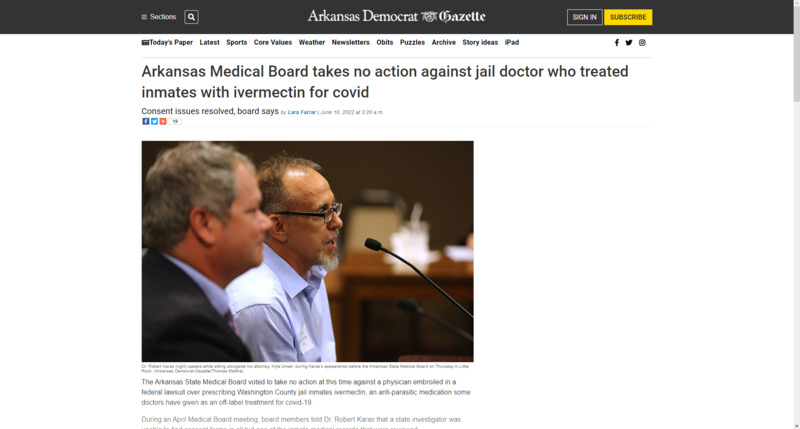
2022-06-10
This is a story detailing Arkansas' Medical Board dismissing charges against a Washington County prison doctor for treating prisoners with ivermectin. Arkansas' Medical Board has not explicitly denounced the drug as a treatment for COVID-19, and many physicians prescribe the drug. This particular physician treated several unknowing prisoners with ivermectin in order to combat rising covid cases in the Washington County Jail in April. This dismissal of charges by the Medical Board reveals a deeper skepticism of the pandemic in Arkansas and a willingness of the board to allow physicians to treat their patients as they ultimately see fit with minimal regulations. I feel it also reveals a deeper understanding of Arkansas' prison system due to the prisoners not being informed of what was given to them, and therefore without consent.
-
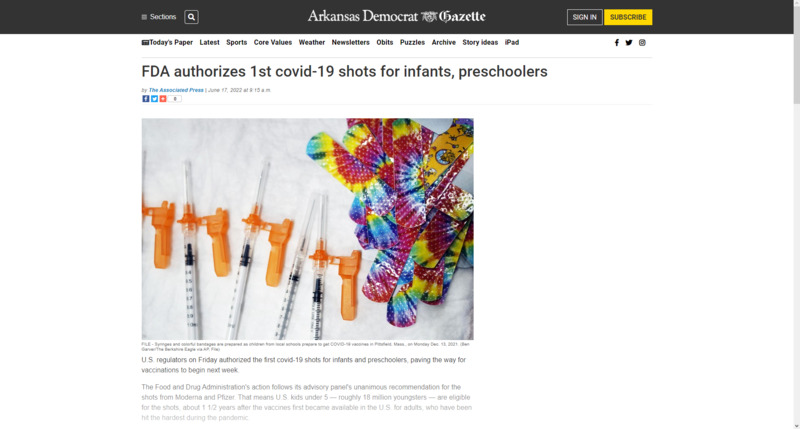
2022-06-17
This article details the FDA's approval for vaccinations of children and infants. With encouragement from the Biden Administration, the youth are the final group with full approval for vaccinations against COVID-19. While this is a good thing for many who take the pandemic seriously, many Arkansans and southerners in general will likely be resistant to this new approval. The south has largely been skeptical of the vaccine and of COVID, and indeed the vaccinating of children with be a harsh topic across the south. It will be interesting to see the backlash and discussion from this decision, as well as analyzing the many questions that will doubtlessly be raised about the powers of the parents.
-
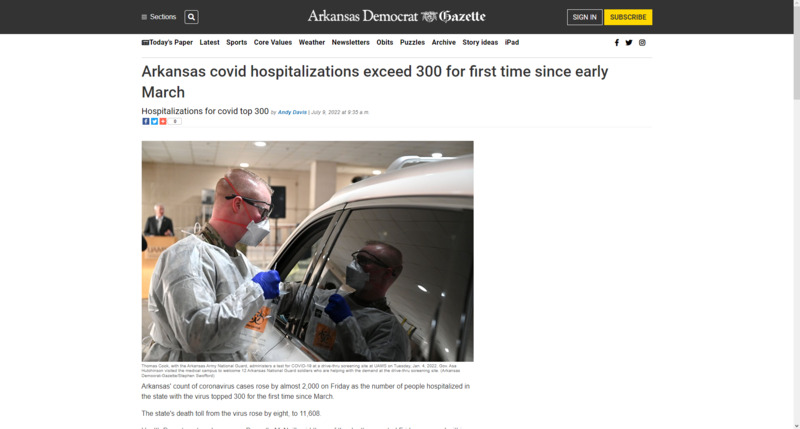
2022-07-09
This is an article detailing a surge in COVID related hospitalizations in Arkansas. The article further mentions an increase in deaths due to COVID-19 and how hospitals are quickly beginning to feel the pressure of overcrowding. The July 4th holiday, doubtless, had an impact. This surge demonstrates not only the minimal precautions taken by individuals as life has seemingly returned to a sense of normalcy, but also demonstrates that many Arkansans are still unvaccinated, and the extreme toll such action is taking on hospitals.
-
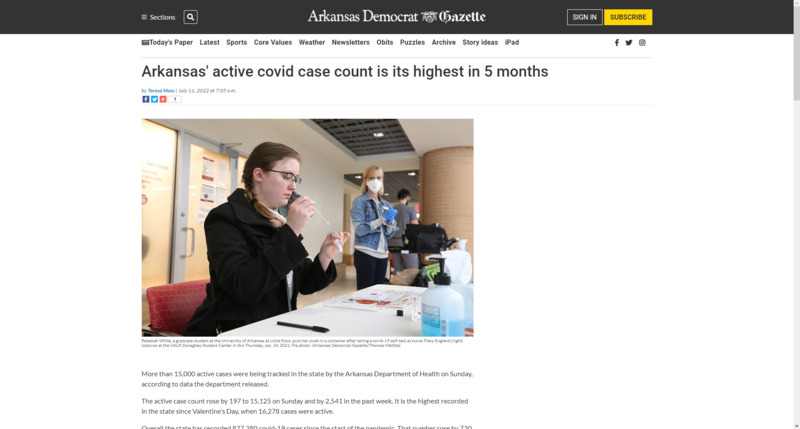
2022-07-11
This article details a recent surge in Arkansas COVID cases. The shocking nature of the rise is the fact that the state's active cases jumped from 197 to 15,125 in a single day. I think this primarily demonstrates the state and the world's rush to reopen, particularly keeping in mind the July 4th holiday, have allowed a sense of deep comfort. However, this comfort can be deadly when individuals who are feeling unwell fail to take precautions to assure the health and safety of themselves and others. While it is encouraging to see life return to a sense of normalcy, this shows that the pandemic is still a present part of our lives.
-
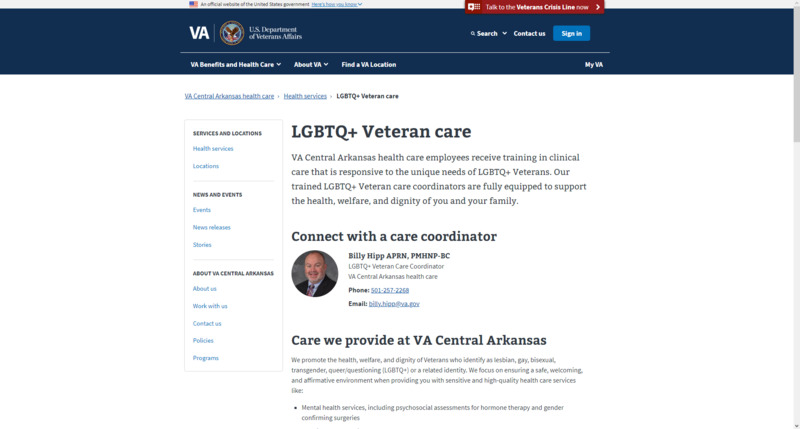
2022-07-11
This is the Arkansas Veterans Affairs website listing specific resources for LGBTQ+ veterans in Arkansas. This site places a specific emphasis on Central Arkansas due to the heavy LGBTQ+ population in that area. In order to combat COVID-19, this site focuses on not only concerted vaccine rollout for LGBTQ+ vets, but also lists mental health resources in order to combat COVID-19. I think this shows a particular vulnerability to a select group and how COVID-19 can reach anyone. Indeed, it is essential that at-risk groups such as the LGBTQ+ community are not overlooked in the age of COVID, and it is encouraging to see the VA take steps to assure this is the case.
-
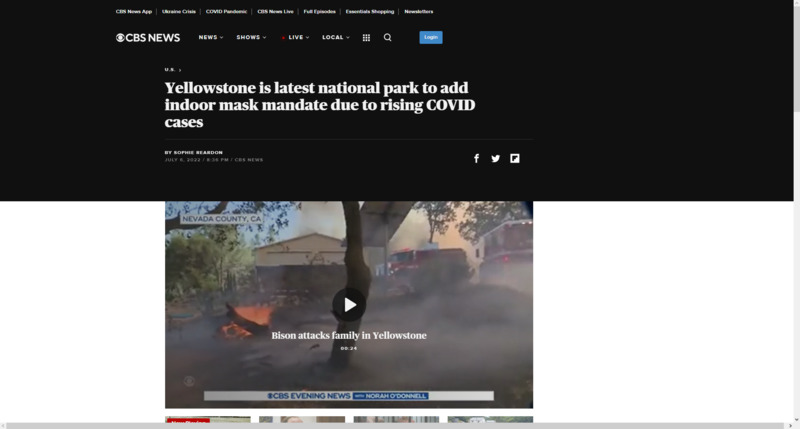
2022-07-06
This is a news story from CBS News from Sophie Reardon. Due to rising cases, Yellowstone National Park will now require visitors two years and older to wear masks indoors. Other national parks have mask mandates too, such as the Grand Canyon, Yosemite, and the Grand Tetons. This requirement is for everyone using an indoor facility, regardless of vaccination status. For future visitors at this time to these parks, it is recommended one look up COVID requirements for the place they wish to go.
-
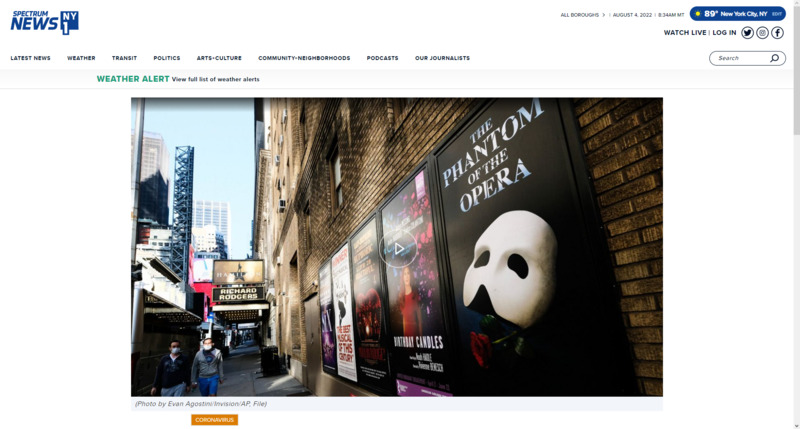
2022-07-05
This is a news story from Spectrum News 1 by Louis Finley. On July 1, a mask optional policy began for Broadway show attendees. This has worried theatergoers and performers alike, as they are now anxious over being exposed to COVID. Some shows, like "Into the Woods," have been negotiating to make masks mandatory for the front row.
-
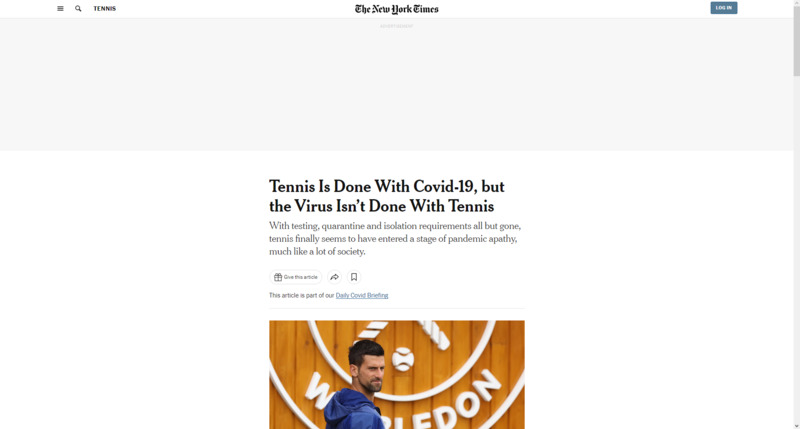
2022-07-10
This is a news story from The New York Times by Matthew Futterman. This story chronicles the changes tennis has gone through during the pandemic. Compared to other professional sports, tennis has been one of the sports with restrictions applied the longest
Novak Djokovic, one of the top tennis players in the world, is noted for his refusal of the COVID vaccine. This caused controversy in 2021 at the Australia Open, where his refusal to get vaccinated resulted in his deportation. The Australian government was worried that his refusal would embolden others.
The rest of the article goes on about what other tennis players have said about the restrictions, and what they mean for the sport. Some of the tennis players expressed not paying attention to restrictions as much as they used to, and wanting to live like they used to.
-
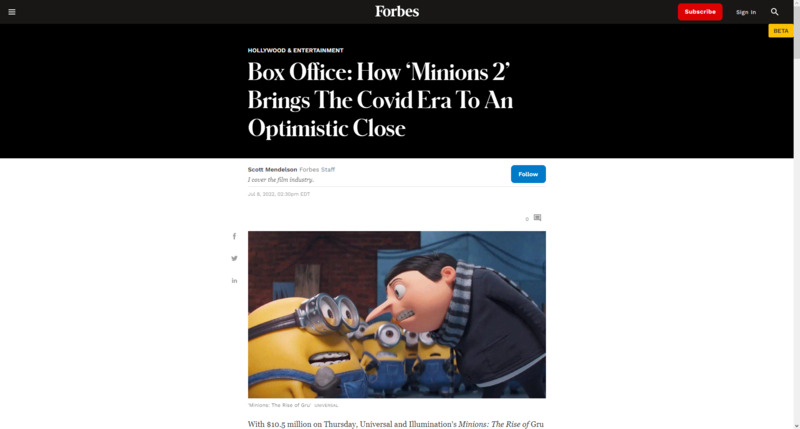
2022-07-08
This is a news story from Forbes by Scott Mendelson. This is an article that discusses the moviegoing habits of people pre and post-COVID. The article mentions that Minions: The Rise of Gru and Top Gun: Maverick were meant to come out in 2020, but they were delayed because of COVID. Due to the high amounts of attendance to both films, the author is speculating that audience members that may have forgone streaming new movies are coming back to theaters. The box office gross for both films has broken records.
Given my own experience of going to the movies recently since COVID began, I noticed that even though I did see signs about masks, it was never enforced, and restrictions were pretty much non-existent. I delayed going to the theaters in-person partly due to not finding many new releases interesting enough, in addition to not wanting to deal with masks while watching. I think that less restrictions make the experience more appealing now than during COVID, as movie tickets have been getting more expensive over the years. In can be hard to justify the steep prices with the restrictions in place that could make it less comfortable. My own experience that I had made it feel like it was the pre-COVID era, and that made it something I enjoyed. I think that given the snacks people eat at theaters, it would have been cumbersome to have to take the mask off and put it on again with eating. If I had to do that, I probably would not have wanted to get any snacks with those restrictions in place, and theaters generally make more revenue from refreshments than they do showing the movie itself. I think that the author is right that the high gross of both films mean that the "summer movie" is returning to what it once was, with audiences that may have been lost during COVID coming back.
-
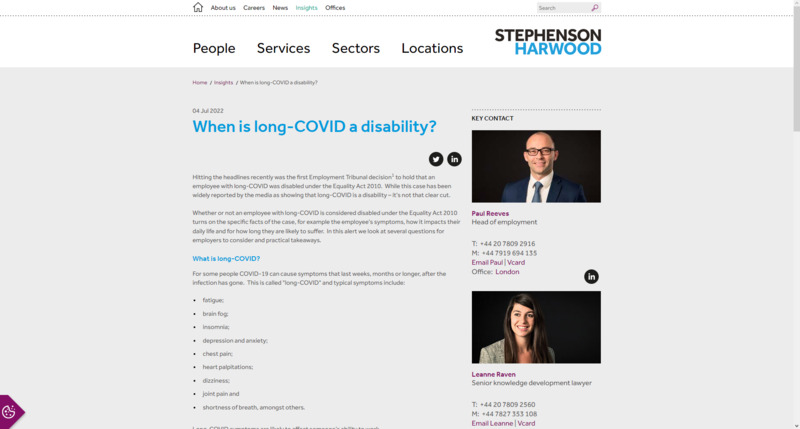
2022-07-04
This is a news story from Stephenson Harwood, a law firm with its headquarters in London. This is on the classification of long-COVID as a disability. Using the Equality Act from 2010, it classifies a disability as physical or mental impairment which would prevent someone's ability to carry out daily activities.
Using a case of Burke v Turning Point Scotland, it describes Mr. Burke developing long-COVID symptoms, which prevented him from doing work. He describes immense fatigue, where tasks like showering would become exhausting. Due to this, he remained off work, with his sick pay ending around June 2021. In August 2021, he was dismissed on grounds of ill health. The ruling with the Scottish Employment Tribunal declared that between November 25, 2020 and August 13, 2021 that Mr. Burke was disabled. For his specific case, he can now file disability discrimination against the company, but it does not mean the employer discriminated.
The law firm suggests that employers develop methods to better serve employees that could end up having long-COVID. Some of these suggestions include: change in policies around disability services, changes in communication to handle an employee suffering from long-COVID, and a supportive environment where employees will feel comfortable giving updates on their symptoms.
-
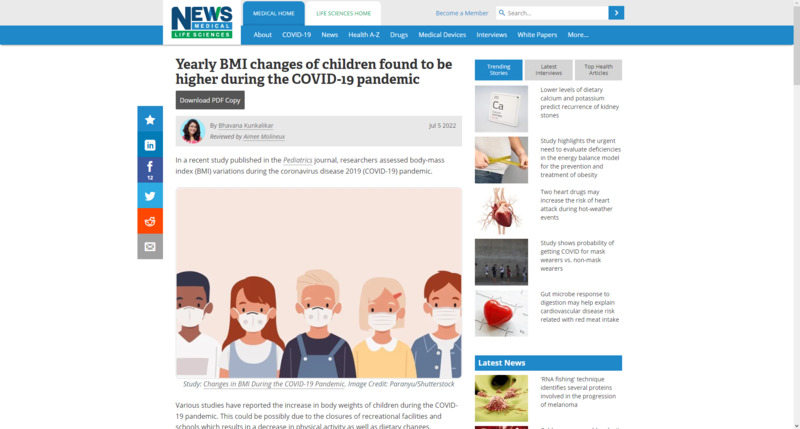
2022-07-05
This is a news story from News Medical Life Sciences by Bhavana Kunkalikar. In a study published by the Pediatrics journal, researchers looked at the BMI variations during the COVID-19 pandemic. The study found that compared to the baseline measurements used pre-pandemic, the pandemic showed an increase in BMI that was .24 higher than the baseline. Higher rates of BMI increased in already obese children compared to children of a healthy weight.
This article does not mention the social factors that would have contributed to weight gain during the pandemic, but not being able to socialize as often probably was a large contributor. From my own personal experience, I notice some people that I knew prior to the pandemic, and noticed that they put on some weight after the pandemic. Granted, this was what I noticed in adults I knew, not kids. Regardless, I believe that even if someone were to eat the same way they did pre-pandemic, but not exercise like they used to during the pandemic, they are bound to put on a bit of weight from lack of activity. Hopefully, with things being less restricted in some places, it will allow people to do things they did pre-pandemic more often and get back to healthier weights.
-
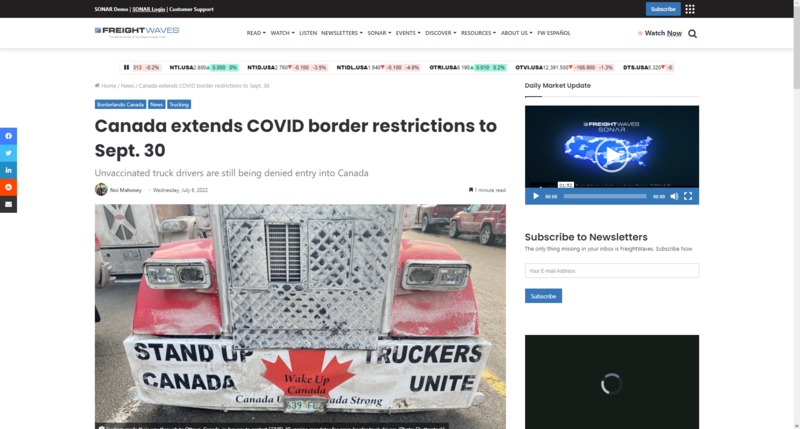
2022-07-06
This is a news story from Freight Waves by Noi Mahoney. Canada's vaccine mandate for border-crossing truck drivers will remain in place until September 30. Americans crossing the Canadian border must be fully vaccinated and are subject to random testing. About 30,000 trucks cross the Canadian border each day.
-
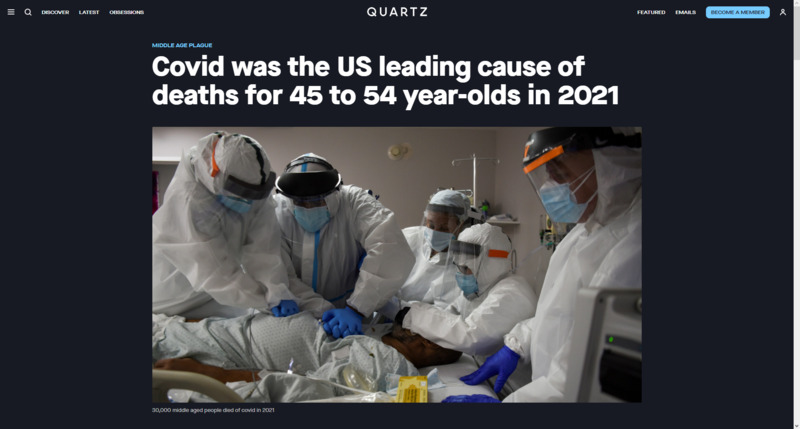
2022-07-08
This is a news story from Quartz by Annalisa Merelli. This news story says that within the deaths that occurred between March 2020 and October 2021, the middle-aged were disproportionately affected. In the 45 to 54 age group, COVID killed more than any other leading causes of death within that time period, including heard disease and cancer.
-
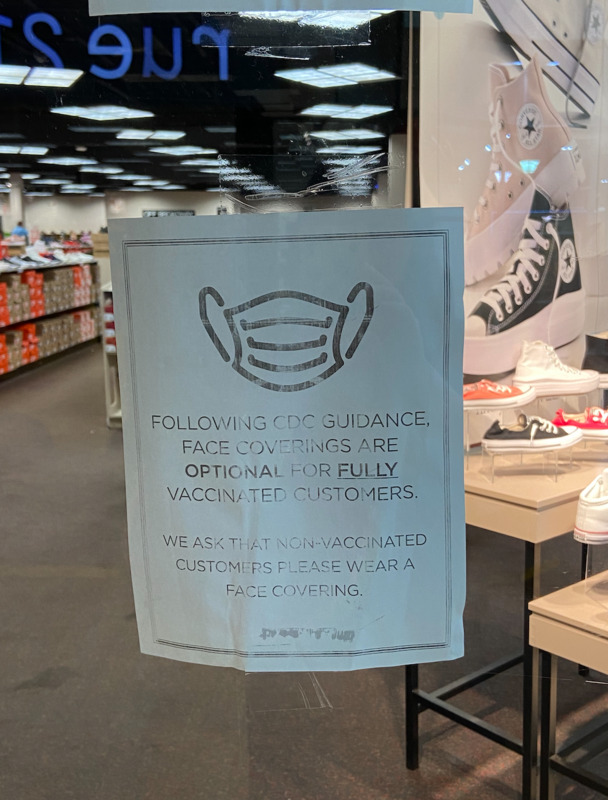
2022-07-05
This is a sign I found outside a shoe store at Arizona Mills Mall. It says that masks are optional for fully-vaccinated customers. I didn't go in the store, so I don't know if they would check for vaccination status or not. From my experience with other places with similar signs, no employee has asked about my vaccination status before shopping. I could see this being enforced a year ago, but not now.
-
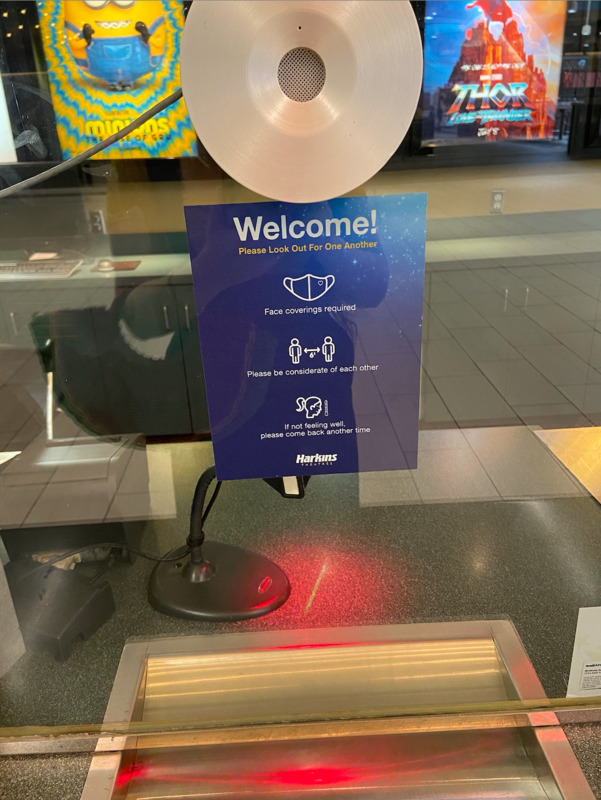
2022-07-05
This is a sign I saw at the Arizona Mills Mall in Tempe, Arizona. The sign recommends you wear a mask, keep a distance, and not come if you are feeling sick. This sign was not enforced when watching a movie at the IMAX the day I went. Not even the workers were wearing masks. This could just be something leftover from a time when this would have been more relevant, such as in 2020 and 2021.
The time I took this picture was actually my first time going to a movie theater since COVID started. The last movie I saw in theaters before the Minion movie was Cats in February of 2020. It was a fun thing to experience again after a long hiatus. I wanted to go at a time when there wouldn't be any restrictions, as it would make the experience less fun. I remember having to wear a mask on a plane when I went for a wedding, and I didn't enjoy having to do that. It would have felt similar had I gone to a movie a year ago when vaccines weren't as distributed as they are now.
-
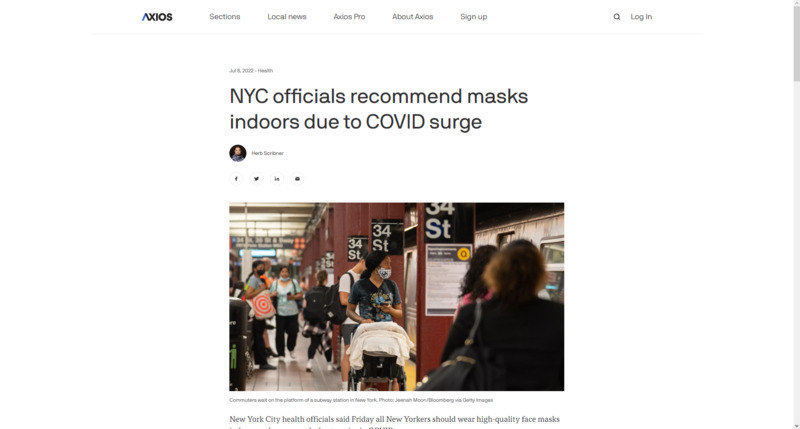
2022-07-08
This is a news story from Axios by Herb Scribner. Due to a rise in COVID cases, health officials in New York City are recommending that people wear high quality face masks indoors or in crowded areas. A CBS News report says that COVID positivity rates have risen 14%, the highest level since January. A subvariant of Omnicron, BA.5, has been responsible for 54% of total COVID cases, according to the CDC.
-
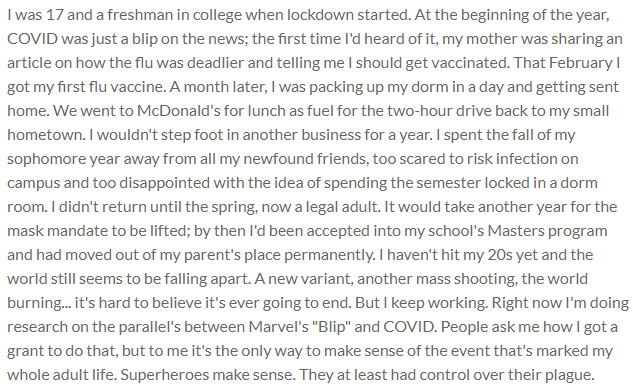
2022-07-06T10:19
I was 17 and a freshman in college when lockdown started. At the beginning of the year, COVID was just a blip on the news; the first time I'd heard of it, my mother was sharing an article on how the flu was deadlier and telling me I should get vaccinated. That February I got my first flu vaccine. A month later, I was packing up my dorm in a day and getting sent home. We went to McDonald's for lunch as fuel for the two-hour drive back to my small hometown. I wouldn't step foot in another business for a year. I spent the fall of my sophomore year away from all my newfound friends, too scared to risk infection on campus and too disappointed with the idea of spending the semester locked in a dorm room. I didn't return until the spring, now a legal adult. It would take another year for the mask mandate to be lifted; by then I'd been accepted into my school's Masters program and had moved out of my parent's place permanently. I haven't hit my 20s yet and the world still seems to be falling apart. A new variant, another mass shooting, the world burning... it's hard to believe it's ever going to end. But I keep working. Right now I'm doing research on the parallel's between Marvel's "Blip" and COVID. People ask me how I got a grant to do that, but to me it's the only way to make sense of the event that's marked my whole adult life. Superheroes make sense. They at least had control over their plague.
-
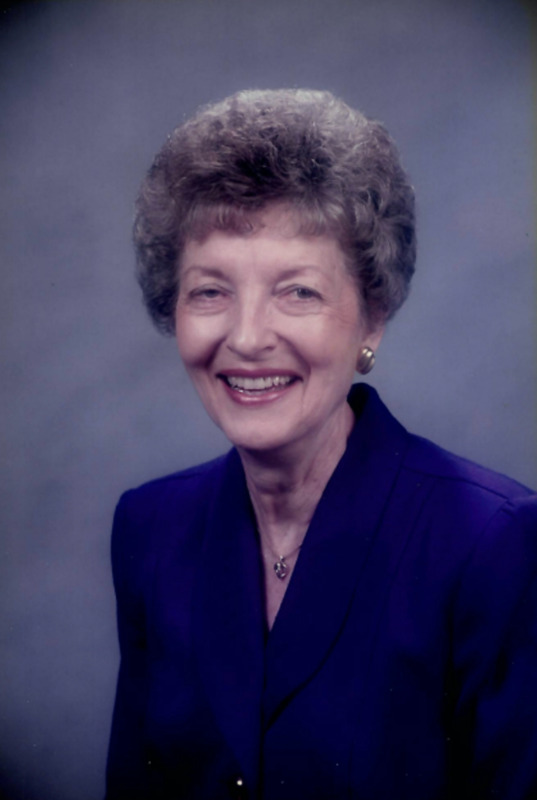
2022-07-02
This is a story of taking care of my grandma during COVID. A lot of the time I was employed as a caretaker for my grandma overlapped with the height of COVID.
-
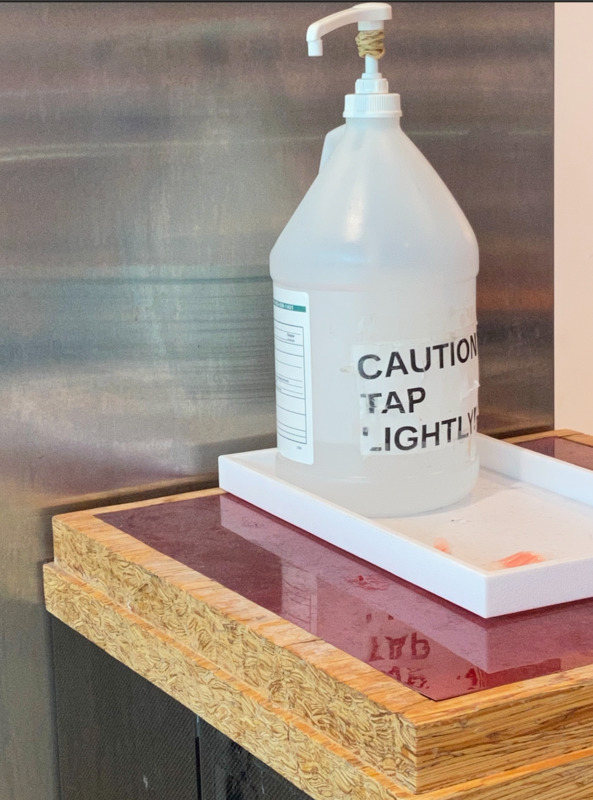
2022-06-27
This is hand sanitizer I found while out shopping at Scottsdale Fashion Square. It was not just this store that had it, others did as well. I didn't notice people using it while I was there, but it might have been used more often when things were opening up more and vaccines were not as well-distributed yet.
-
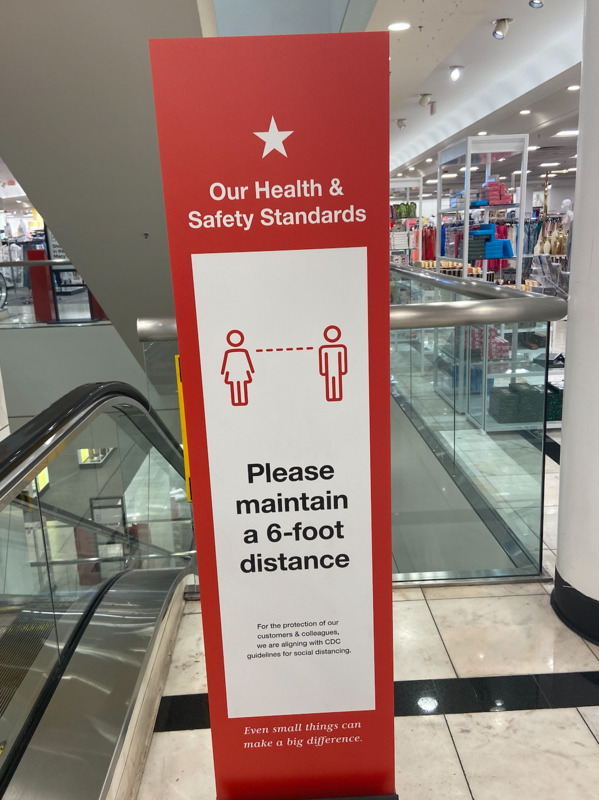
2022-06-27
This is a sign I found at the mall. It is telling people to maintain a distance when shopping. This isn't enforced. However, I imagine only a year ago it being a bigger deal than it is now. I was just glad I found this sign, as it is a relic of the time when this was a larger issue.
-
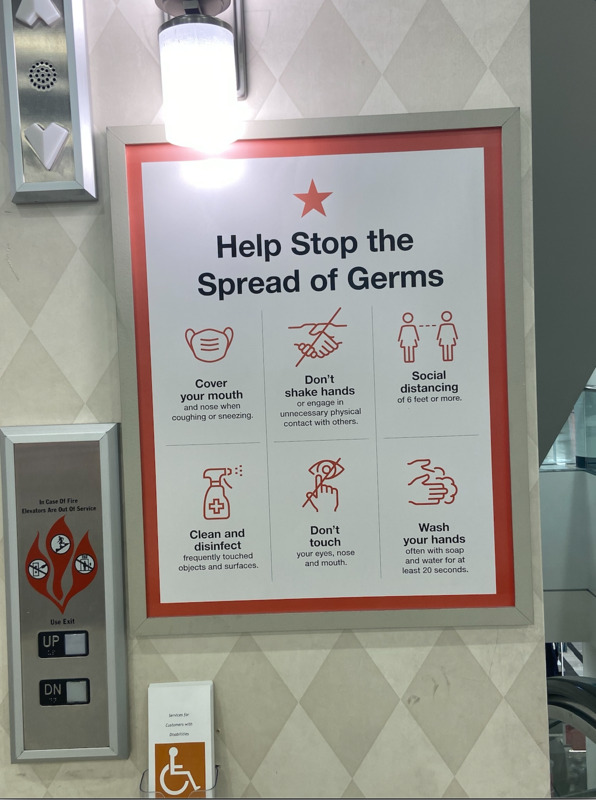
2022-06-27
This was a sign I found at Macy's while at Scottsdale Fashion Square. This sign tells people to cover their mouth and nose while sneezing, use social distancing, and to avoid things like shaking hands. However, the time I went to Macy's did not have many restrictions in place. Some customers chose to wear masks, but at the point in time I went, it was not high alert.
-
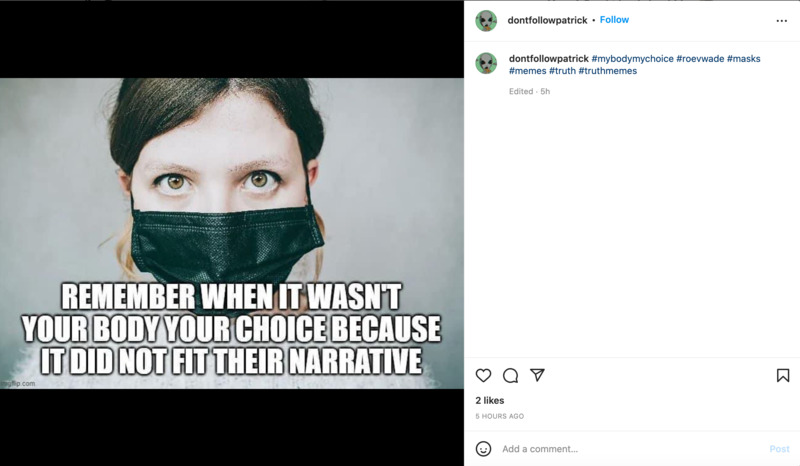
2022-06-26
This is an Instagram post from dontfollowpatrick. This is a meme posted regarding bodily autonomy. For pandemic skeptics, "my body, my choice" has been common rhetoric with things like masks and vaccines. Dissenters claim that it is not a valid argument because the actions of one person in a public health crisis affect other people around them. With things like abortion, it is seen as an individual decision that does not affect others the way not wearing a mask would.
-
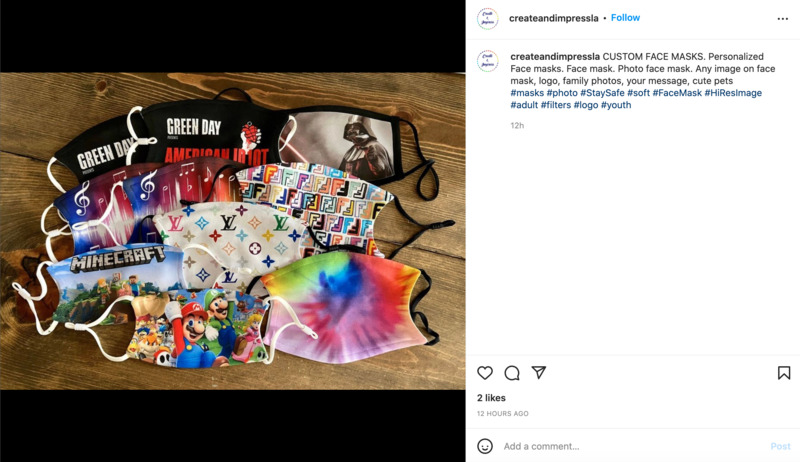
2022-06-26
This is an Instagram post from createandimpressla. This company is offering customizable masks, where you can submit and image you like and have it be made into a mask. The picture attached shows just some ways people have customized masks.
-
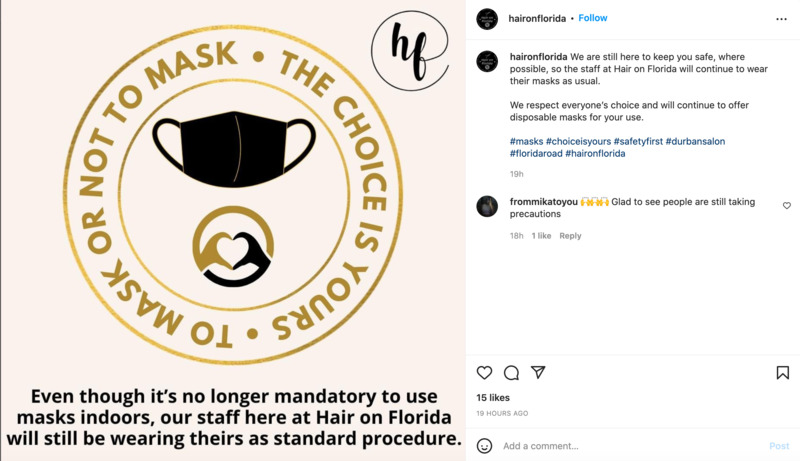
2022-06-25
This is an Instagram post from haironflorida. The post says that the staff will continue wearing masks, but people are given the option of not wearing mask if they wish.
-
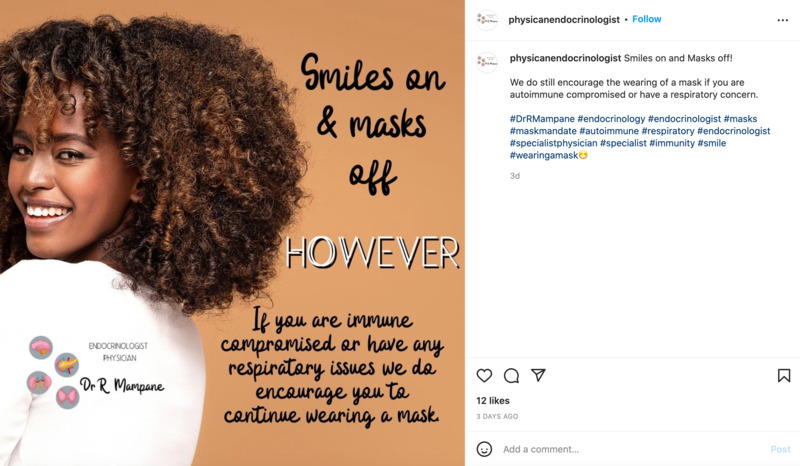
2022-06-23
This is an Instagram post from physicianendocrinologist. This is about a changing mask policy at the endocrinologist office that posted this. It encourages people that are immunocompromised to wear masks though.
-
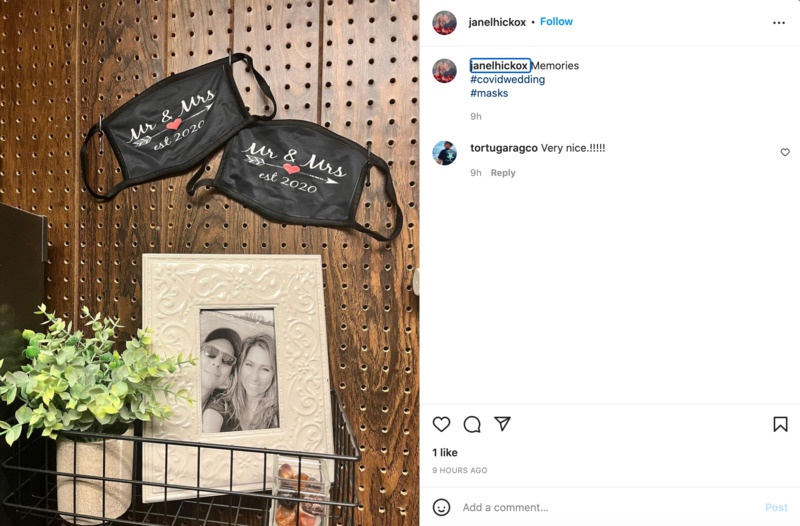
2022-06-26
This is an Instagram post from janelhickox. It is about a COVID wedding, and part of the wedding included masks with the couple's date.
-
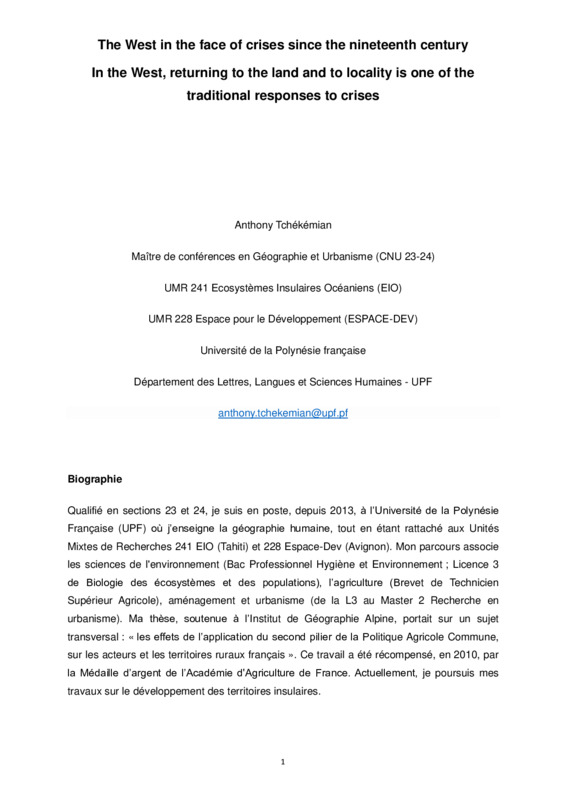
2022
Confronted with what may appear to be a series of global crises - health, environmental, economic and even democratic - the ideas on the virtues of what is local and rural are becoming increasingly heard. This article aims at putting this return to locality in historical perspective. For almost three hundred years, Western societies have gone through profound changes, especially economic ones, at the cost of a break with nature, in a more or less dramatic, and more or less painful way. Throughout our recent history, surprisingly diverse voices (political leaders, artists, activists, etc.) have conjured up this return to the land, which has taken on various forms. This return appears to be a providential solution to these disruptive changes. The health crisis due to Covid 19 seems to have not only confirmed, but also exacerbated this trend.
-
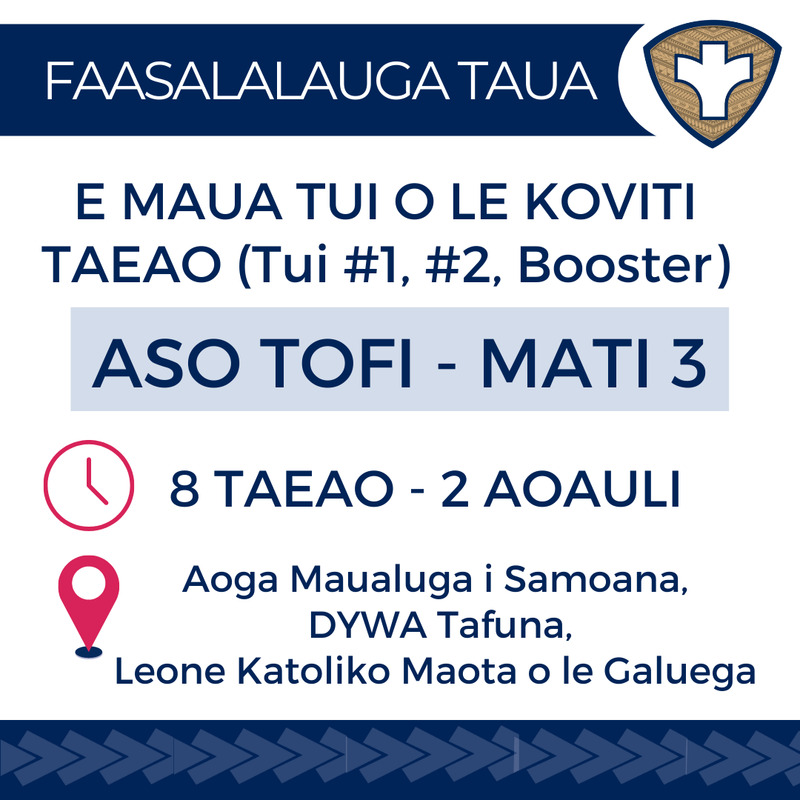
2022-03
These are some of the many flyers by the American Samoa Department of Health for the people of American Samoa on information about the where, when, how, what, and why of COVID 19 vaccinations and tests on the island.
-
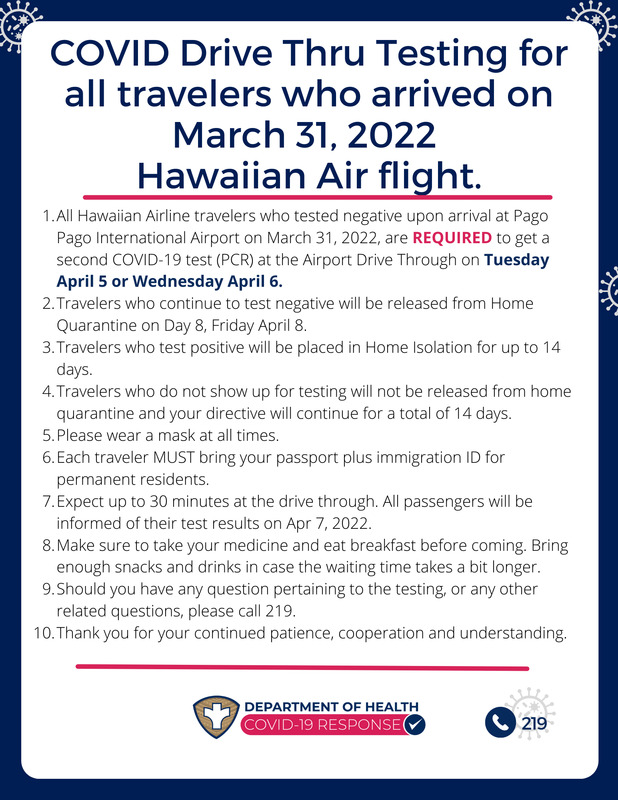
2022-04
Opening up the borders in American Samoa was great news for Samoans that were stuck in the states for a year and a half borders were closed in American Samoa. And just when they think going home would be easy, it wasn't. There were a lot of requirements that were set by the government for travelers to follow when entering the island. This was one of the many requirements that travelers had to follow to ensure the safety of the people of American Samoa. Even if your test came negative upon arrival, you still had to get a second test to make sure that you do not have COVID. Somehow, despite these requirements, restrictions, and quarantine, cases still emerged on the island.
-
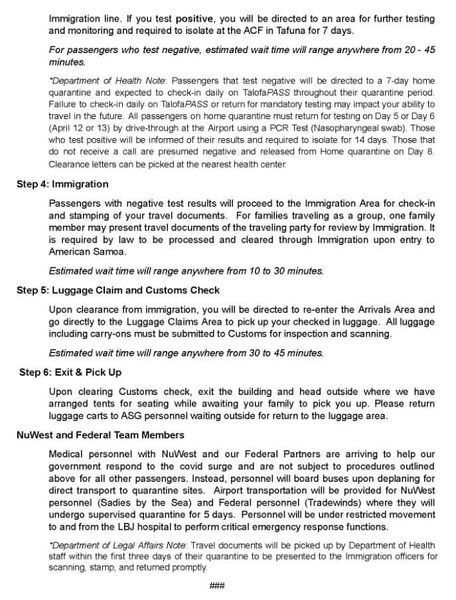
2022-04-07
The Governor and Lt. Governor of American Samoa has issued arrival requirements for travelers on the April 7th Hawaiian Air Flight coming into the island. These requirements are to ensure the safety of the people of American Samoa and as well as the travelers traveling to American Samoa from COVID-19.
-
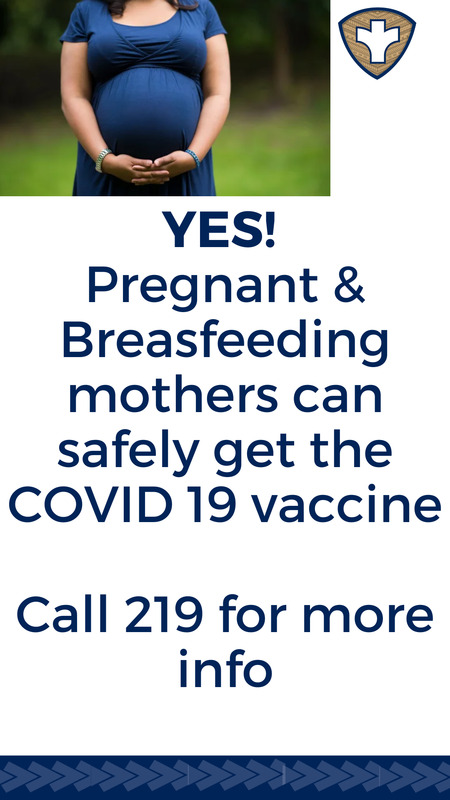
2022-04
The American Samoa Department of Health released this flyer for pregnant women that can get vaccinated safely. This is a piece of great information for the public, especially for pregnant women who are wondering if they can get the vaccine.
-
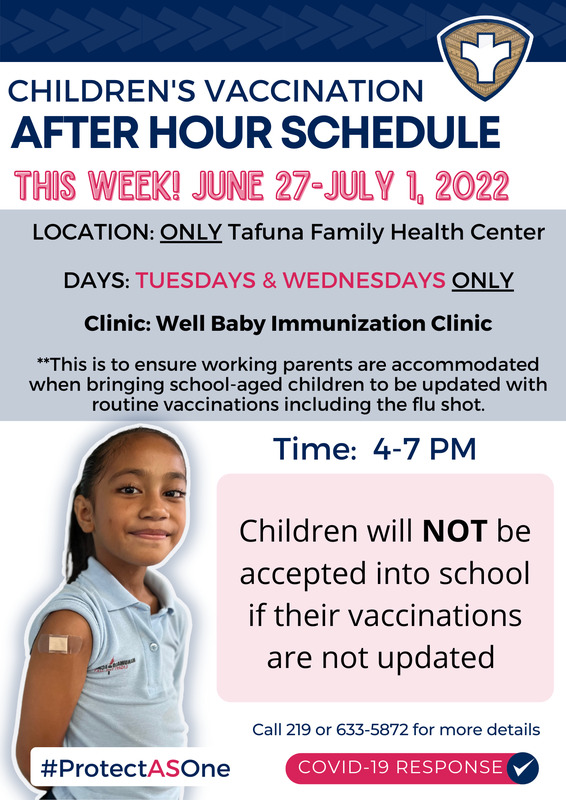
2022-06-27
With schools opening back up in American Samoa, children are required to get vaccinated. As the Department of Health points out that children will not be accepted into school if their vaccinations are not updated. The Department of Health has put out this flyer on June 26, 2012, for the public especially working parents to get their children's vaccination after hours from 4-7 pm on June 27 - July 1.
-
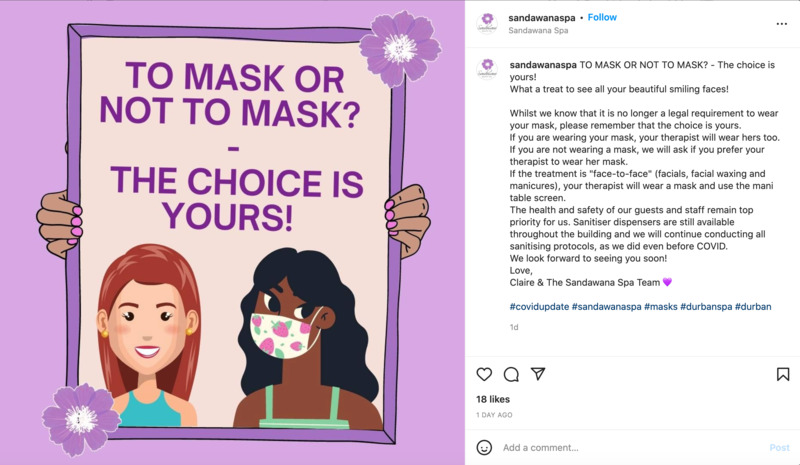
2022-06-25
This is an Instagram post from sandawanaspa about masking. The company is saying that you no longer need a face mask as a requirement for their services.
-
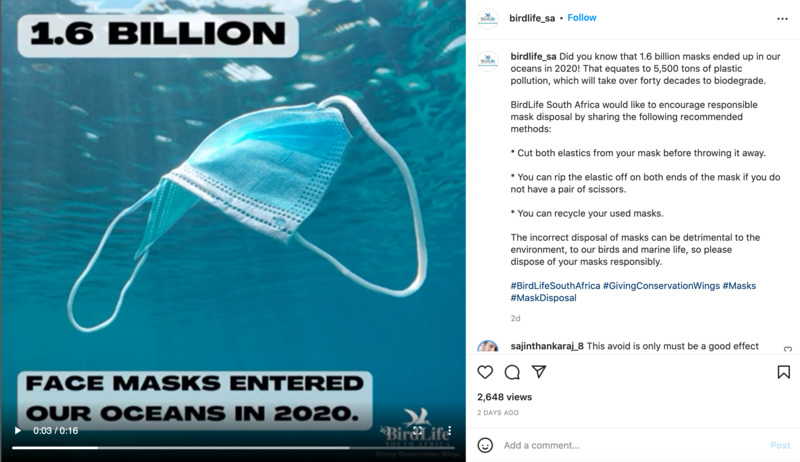
2022-06-24
This is an Instagram post from birdlife_sa. It discusses the amount of face masks that ended up in the ocean, and what you can do to make your mask disposal more environmentally friendly.
-
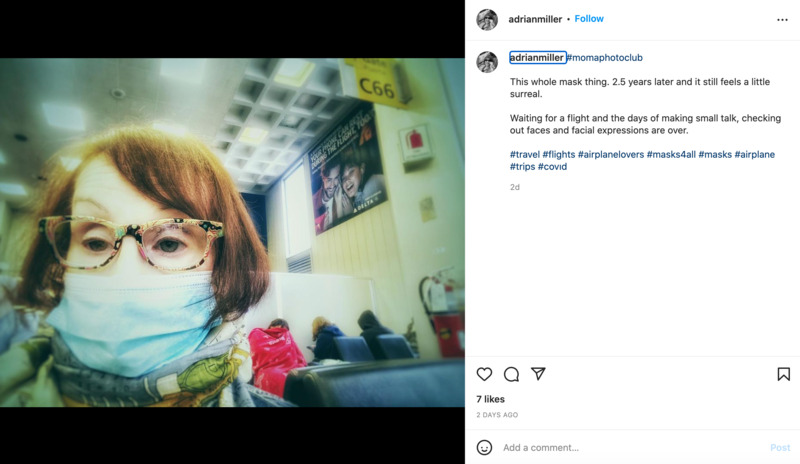
2022-06-24
This is an Instagram post from adrianmiller. Here, she is recounting changes that have happened within the last 2.5 years of COVID. These changes include not making small talk or checking for people's facial expressions.
-
2022-06-24
This is an Instagram post from ecowhizz_sa. This is a post advising people to dispose of their masks properly to protect the environment.
-
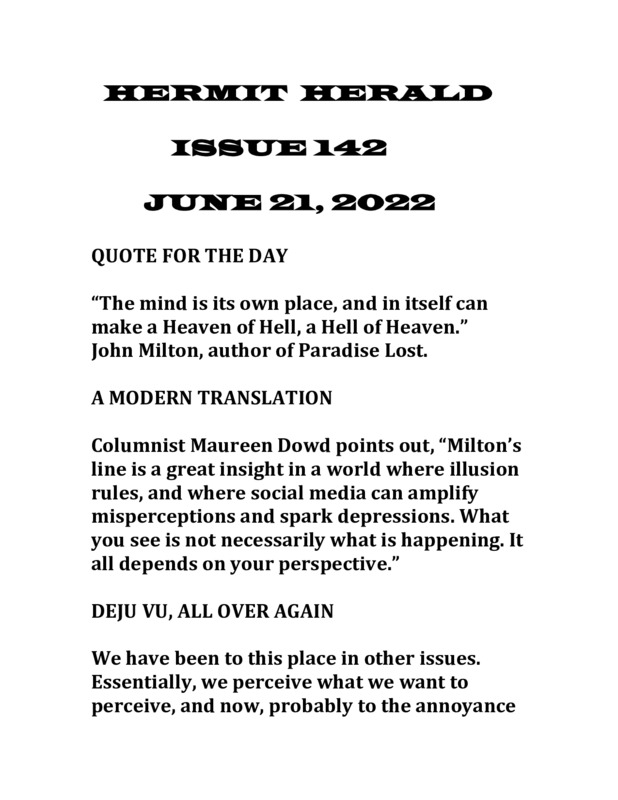
2022-06-21
We perceive what we want to perceive
-
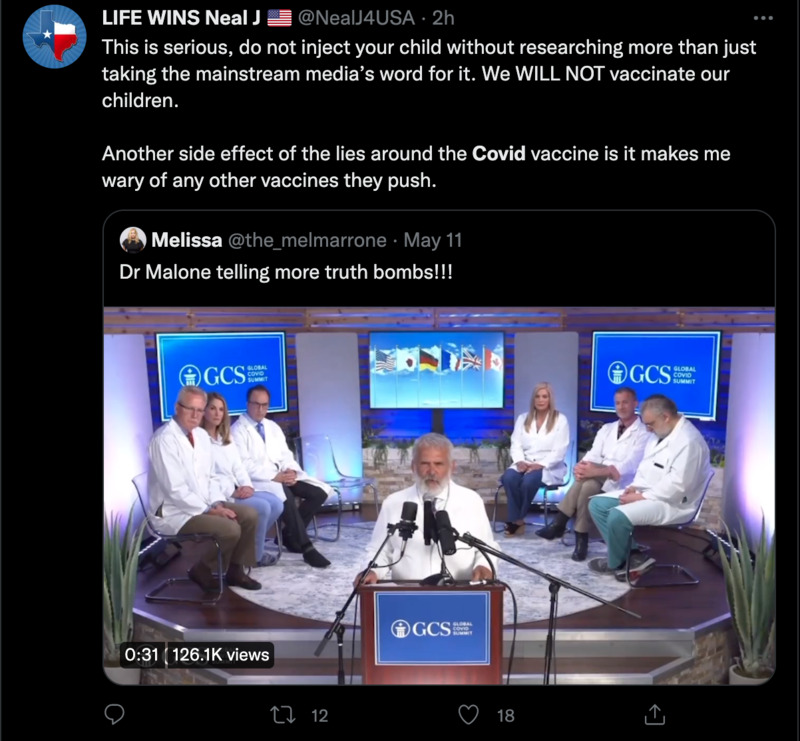
2022-06-25
This is a tweet from NealJ4USA. This person has decided not to vaccinate their children after having done some research on the subject. Due to distrust in the COVID vaccine, it is also making this person feel more hesitant about any other vaccines that end up getting pushed.
-
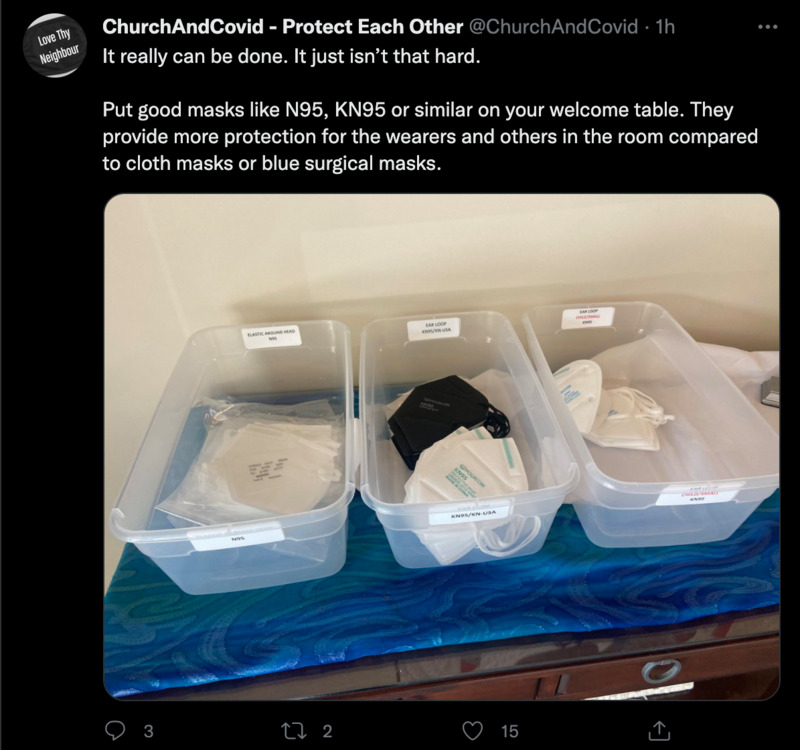
2022-06-25
This is a tweet from ChurchAndCovid. This account is trying to help people out in finding ways for people to protect themselves during worship services. The account recommends that instead of providing cloth or surgical masks, it would be more effective to have N95 and KN95 masks instead. Some churches have taken different approaches to COVID, and as we can see here, some churches practice more precaution than others.
-
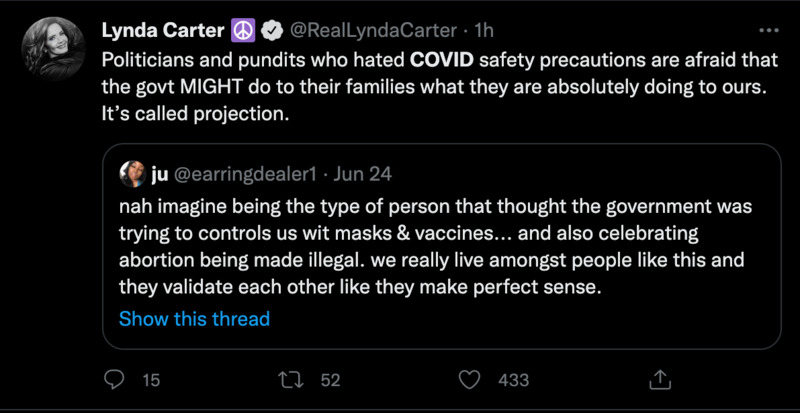
2022-06-25
This is a tweet from RealLyndaCarter. Lynda Carter is famous for her role in the Wonder Woman TV series. Here, she is expressing anger at those who hated COVID safety precautions wanting to control what people do with their health on abortion.
-

2022-06-25
This is a tweet by StabbyandSpicy. This person is expressing their frustrations over their mom getting COVID, and the Supreme Court decision on Roe v. Wade being overturned.
-
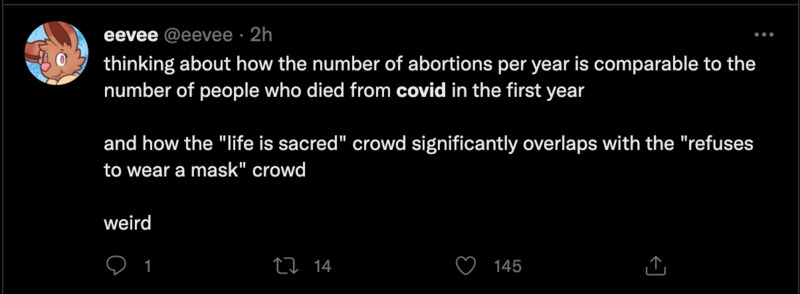
2022-06-25
This is a tweet from eevee. This person is saying that those who refuse to wear masks are helping create as many COVID deaths as there are abortions per year. It is meant to point out the hypocrisy of people claiming "life is sacred" while being flagrant about wearing masks, which they argue is not pro-life.
-

2022-06-25
This is a tweet from myrabatchelder. This person is advising other about the risks of long COVID, saying people should wear masks in indoor and crowded settings.
-
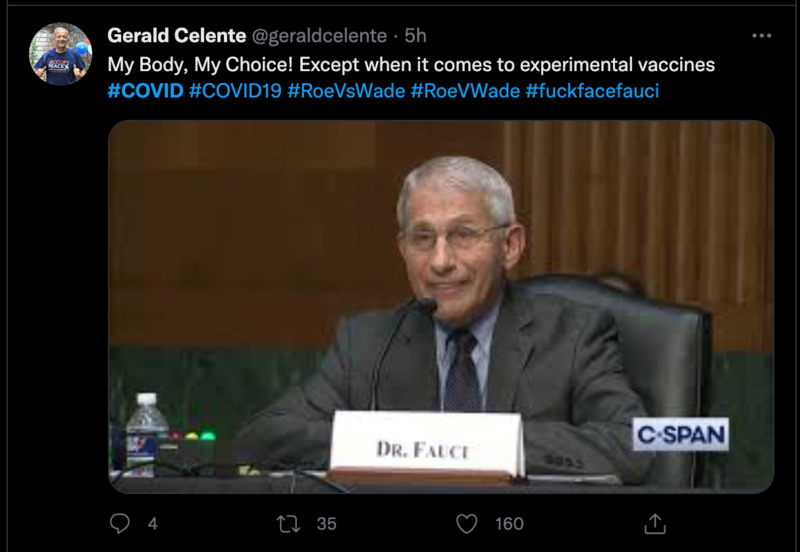
2022-06-25
This is a tweet from geraldcelente. This person is expressing their anger towards Dr. Fauci and his ideas on what "my body, my choice" actually consists of. Within the vaccine skeptic communities, people like Dr. Fauci are held in contempt due to his stances on things like masks, vaccines, and lockdowns.
-

2022-06-25
This is a tweet from bobbicallie. This person is announcing the joy they have in receiving their second COVID booster shot. They are also worried about long COVID, so despite getting the vaccine booster shots, this person has decided to continue wearing a mask.
-
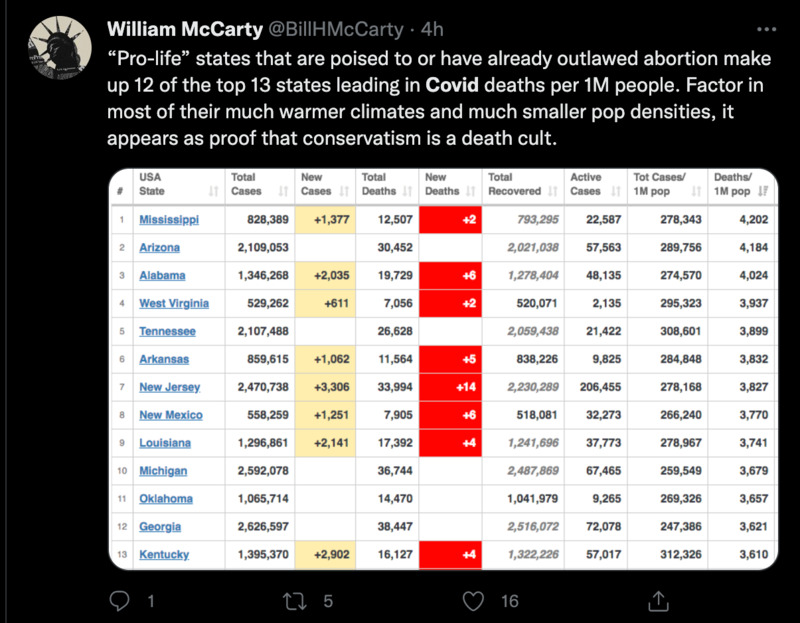
2022-06-25
This is a tweet from BillHMcCarty. This person is criticizing the amount of COVID deaths that are happening is states that are looking to outlaw or heavily restrict abortion.
-
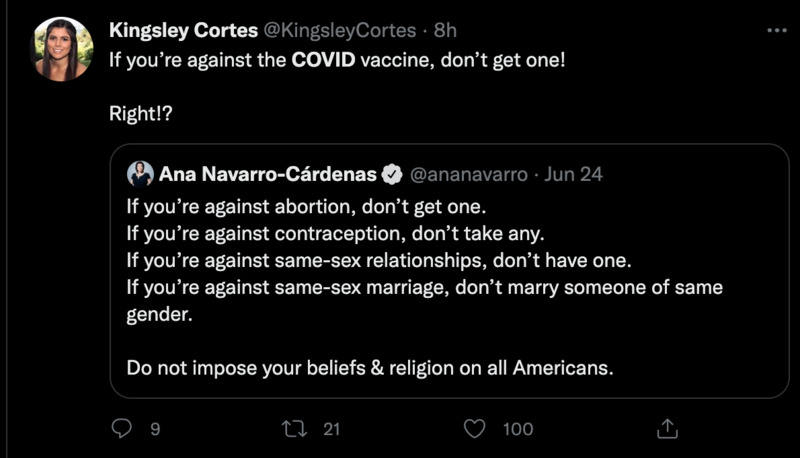
2022-06-25
This is a tweet from KingsleyCortes. She is criticizing the general Democrat talking points with things like abortion and gay marriage by pointing out that many Democrats were in favor of people getting the vaccines. The vaccines were not voluntary in some cases, where people were coerced into getting them at the risk of losing their jobs. People have many different takes on these hot button issues, but this is the best way I can explain it.
-

2022-06-25
This is a tweet from metraux_julia. She is discussing the importance of wearing a mask for those that could be at high risk. For disabled people, they often face higher chances of getting COVID, in addition to having more complications with it. This is an advisement specifically for attending protests.
-
2022-06-25
This is a tweet from Connybub. This person is pointing out the hypocrisy of the pro-choice crowd and their use of "my body, my choice" while many in this same group also wanted people to take the vaccines against their own will. This is obviously a very controversial topic, and there have been people using different aspects of the vaccine debates and the abortion debates to show which side in the correct one.
-

2022-05-03
This is a tweet from CJ_isnowblue regarding the leaked opinion from the Supreme Court on abortion. She is criticizing the way Republicans have protested for their rights to bodily autonomy on things such as mask mandates and vaccines, while wanting to restrict the bodily rights women have. Throughout the pandemic, the abortion debate has come up a time or two due to the "my body, my choice" rhetoric being used by those against masks and vaccines. Prior to this, it was mainly used for discussions on abortion, but now the two subjects are getting linked in public discourse.
 2022-06-10
2022-06-10 2022-06-17
2022-06-17 2022-07-09
2022-07-09 2022-07-11
2022-07-11 2022-07-11
2022-07-11 2022-07-06
2022-07-06 2022-07-05
2022-07-05 2022-07-10
2022-07-10 2022-07-08
2022-07-08 2022-07-04
2022-07-04 2022-07-05
2022-07-05 2022-07-06
2022-07-06 2022-07-08
2022-07-08 2022-07-05
2022-07-05 2022-07-05
2022-07-05 2022-07-08
2022-07-08 2022-07-06T10:19
2022-07-06T10:19 2022-07-02
2022-07-02 2022-06-27
2022-06-27 2022-06-27
2022-06-27 2022-06-27
2022-06-27 2022-06-26
2022-06-26 2022-06-26
2022-06-26 2022-06-25
2022-06-25 2022-06-23
2022-06-23 2022-06-26
2022-06-26 2022
2022 2022-03
2022-03 2022-04
2022-04 2022-04-07
2022-04-07 2022-04
2022-04 2022-06-27
2022-06-27 2022-06-25
2022-06-25 2022-06-24
2022-06-24 2022-06-24
2022-06-24 2022-06-21
2022-06-21 2022-06-25
2022-06-25 2022-06-25
2022-06-25 2022-06-25
2022-06-25 2022-06-25
2022-06-25 2022-06-25
2022-06-25 2022-06-25
2022-06-25 2022-06-25
2022-06-25 2022-06-25
2022-06-25 2022-06-25
2022-06-25 2022-06-25
2022-06-25 2022-06-25
2022-06-25 2022-05-03
2022-05-03